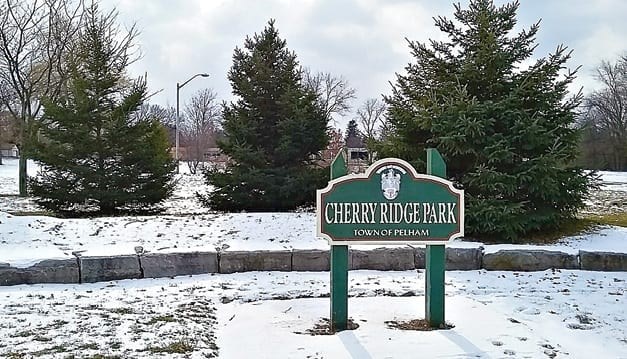Says official soccer program doesn't even exist
BY NATE SMELLE The VOICE
Residents of the Cherry Ridge subdivision adjacent to the controversially renamed Wellington Heights Public School have been continuing their fight with the District School Board of Niagara (DSBN) regarding their plan to annex part of Cherry Ridge Park.
Cherry Ridge resident Marcy Tennier, an elementary teacher with the DSBN, is one of a growing number of individuals compelled to speak out against her employer. Considering the resounding public opposition to both the E. W. Farr name change and the DSBN’s attempt to poach part of the park, Tennier cannot understand the Board’s refusal to engage with the people they are supposed to serve.
“This fight needs to happen because it’s about a bigger issue — it’s about democracy,” she said.
“I mean who do the Trustees think they are? They are representatives of the people, and to me they’re not doing that, so why are we paying them? No one is listening, and that’s the most disturbing point. It’s our money, it’s our world, and it’s our lives, and they don’t seem to live in it. They forget that they are public servants.”
When Tennier learned of the memorandum of understanding between the Town and the DSBN related to “sharing” Cherry Ridge Park, she was astonished that it was even being considered.
“I just don’t understand why you would even ask people if you could take part of their land,” she said.
“I also have to really question the wisdom of our Mayor and Council for even considering that. If someone asked me if they could take some of the land I own, I would say no, and that’s the end of that conversation. It would go no further.”
With a 16-year-old daughter who will be playing Pelham soccer again this year, and a 21-year-old daughter who played until she was 12, Tennier believes that eliminating already limited green space is not imperative to the continuation of the program, which is run by teachers who volunteer their time after school.
“The soccer program is a ‘program’ insofar as teachers volunteer their time outside of regular school hours to supervise and coach a team,” said Tennier.
“They’ve blown the whole notion of a ‘program’ out of proportion. There is nothing in our curriculum that specifies our children need to have soccer skills. I’m not a soccer hater.... I work with kids and I’ve been a teacher since 1991. I find I’m almost ready to quit my job and become a lobbyist.”
It is not customary for teachers and other education workers to provide supervision off school property during nutrition breaks and recesses. Therefore, Tennier said, it seems unlikely that the field would be used at those times in the interest of student safety. She also takes issue with the proposed location, citing a variety of natural features of the landscape which make the site illogical.
“It falls under this lovely umbrella they call ‘community partnership,’ which basically means stealing from Peter to provide for Paul because they haven’t done their homework,” said Tennier.
“It’s fiscally irresponsible to approve plans without even looking at them. When I built my house...I made sure it would fit on the property, it met the setbacks, it met my needs and I went over everything with a fine-toothed comb. If I can do that, then someone making six figures of public money can certainly do that. They did a survey so they knew the swale was there.”
Tennier said that in all the years she spent working as a teacher in Toronto, she never experienced anything like this with the Etobicoke Board.
Having been involved in academics for most of her life, she said she is tired of seeing people talked down to because they ask questions. Educators are supposed to teach their students about things such as integrity, respect and responsibility, she said. From her perspective, none of these values have been exhibited by the Board on either of these issues.
“You don’t always agree with people [on a big city board] but you are allowed to question. You’re allowed to disagree, and it’s promoted because it’s a way to finding resolutions and answers that everyone can live with. Here it’s very heavy-handed, and they tell us no, this is how it shall be done. I was one of those people who wanted to be a principal, then I came down here and I was like, oh my god, this is a scary place. There are a lot of big fish in a really small pond.”



